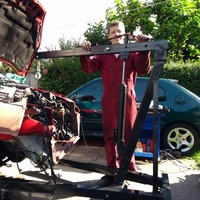I routinely post on the Citroen forum re my C5 (too often!). However, this week I have been trying to get a relative’s 2005 Renault Clio II 2.0 Sport through an MOT. I found a potentially dangerous issue with the rear brakes. The owner replaced the rear callipers and pads a year or so ago, but the discs have rusted since and show only partial pad contact. He bought new discs and yellow stuff pads and asked me to fit them to get through an MOT.
On examination, the calliper pistons were not engaging squarely with the back of the piston pads. Specifically, the piston faces were sat on the locating lugs of the pads. So, either the lugs on the pads were too high, or the notches in the pistons too shallow, such that the piston contact was skewed. On fitting the yellow stuff pads with new discs, the same thing occurred. Hence, I must conclude that the notches in the piston face are at fault. I solved the problem by grinding a millimetre or so off the lugs of the yellow stuff pads. The photos show the old pads with witness marks showing the irregular piston contact, and the yellow stuff pads showing the resulting gap (before grinding down the lug).
Depth of piston face notches = 1.79mm
Height of lugs on pads removed = 2.33mm
Height of lugs on new yellow stuff pads = 2.69mm
But I am amazed this can happen. I do not know where the callipers came from, but he states they were recommended on a Clio Sport chatroom. This worries me because that chatroom also covers modifications and upgrades for amateur track days. I also note that it is entirely possible for the unwary amateur to fit the pads with the lugs to the calliper, and those without to the piston. Indeed, the callipers have a recess which looks like it was intended to accommodate the lugs.
2005 Clio Sport II 2.0 - Dangerous Rear brakes
-
aspire_helen
- Posts: 198
- Joined: 08 Sep 2020, 22:12
- x 72
-
Dormouse

- Donor 2024
- Posts: 2145
- Joined: 15 Apr 2021, 14:32
- x 698
Re: 2005 Clio Sport II 2.0 - Dangerous Rear brakes
"Track Day" mods are dangerous when you discover the reason for some of them.
I remember a car having its rear hub flanges on the arm ground and chiselled off and the bolt on hubs just re-bolted to the thin metal left on the arms. Why? Because the owner had already bought a set of wide wheels and tyres and needed them to clear the outer wheel arch. They ended up having minimal tyre clearance inside and out and would have touched when cornering or worse.
So, just because a nice set of wheels were available the car was butchered and strengthening plates removed.
All because the owner followed the information given to him by a fellow modder and was told the wheels and tyres would fit. They did, just - static and not moving.
Multple that by the number of people modding their cars and the possible dangerous issues is scary large.
I remember a car having its rear hub flanges on the arm ground and chiselled off and the bolt on hubs just re-bolted to the thin metal left on the arms. Why? Because the owner had already bought a set of wide wheels and tyres and needed them to clear the outer wheel arch. They ended up having minimal tyre clearance inside and out and would have touched when cornering or worse.
So, just because a nice set of wheels were available the car was butchered and strengthening plates removed.
All because the owner followed the information given to him by a fellow modder and was told the wheels and tyres would fit. They did, just - static and not moving.
Multple that by the number of people modding their cars and the possible dangerous issues is scary large.
-
MattBLancs

- Donor 2024
- Posts: 3837
- Joined: 25 Apr 2022, 09:03
- x 1780
Re: 2005 Clio Sport II 2.0 - Dangerous Rear brakes
Surprised at this and when saw the first picture was convinced the piston had not been rotated to align slot with the pads peg.
Am also surprised that even if assembled as shown in second image that normal use would not have given (wedge shaped) friction material and hence full disk contact in relatively short time - perhaps the fact rear brakes of front wheel drive hatchbacks have so little to do that the rapid wear of the pad that did contact still took too long before the disk surface was severely corroded where contact had not yet been made. (Agree doesn't look right too!)
Further to this I'd put standard pads on the back as likely a waste of time on the back regardless!
Think I have seen pads where both of each pair had the peg, and as you describe pad carrier opposite the caliper had clearance to miss the peg.
Am also surprised that even if assembled as shown in second image that normal use would not have given (wedge shaped) friction material and hence full disk contact in relatively short time - perhaps the fact rear brakes of front wheel drive hatchbacks have so little to do that the rapid wear of the pad that did contact still took too long before the disk surface was severely corroded where contact had not yet been made. (Agree doesn't look right too!)
Further to this I'd put standard pads on the back as likely a waste of time on the back regardless!
Think I have seen pads where both of each pair had the peg, and as you describe pad carrier opposite the caliper had clearance to miss the peg.
